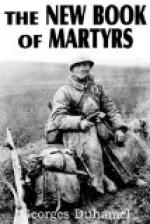“You sleep too much, my poor Croquelet.”
He answers me with his rugged accent, but in a feeble voice:
“Don’t listen to him; it’s not true. You know quite well that I can’t sleep, and that you won’t give me a draught to let me get a real nap. This afternoon, I read a little. ... But it wasn’t very interesting. ... If I could have another book. ...”
“Show me your book, Croquelet.”
He thrusts out his chin towards a little tract. I strike a match, and I read on the grey cover: “Of the Quality of Prayers addressed to God.”
“All right, Croquelet, I’ll try to get you a book with pictures in it. How do you feel this evening?”
“Ah! bad! very bad! They’re thawing now. ...”
He has had frost-bite in his feet, and is beginning to suffer so much from them that he forgets the wound in his side, which is mortal, but less active.
IV
I have come to take refuge among my wounded to smoke in peace, and meditate in the shadow. Here, the moral atmosphere is pure. These men are so wretched, so utterly humiliated, so absorbed in their relentless sufferings that they seem to have relinquished the burden of the passions in order to concentrate their powers on the one endeavour: to live.
In spite of their solidarity they are for the time isolated by their individual sufferings. Later on, they will communicate; but this is the moment when each one contemplates his own anguish, and fights his own battle, with cries of pain. ...
They are all my friends. I will stay among them, associating myself with all my soul in their ordeal.
Perhaps here I shall find peace. Perhaps all ignoble discord will call a truce on the threshold of this empire.
But a short distance from us the battle-field has thundered unceasingly for days. Like a noisy, complicated mechanism which turns out the products of its internal activity, the stupid machine of war throws out, from minute to minute, bleeding men. We pick them up, and here they are, swathed in bandages. They have been crushed in the twinkling of an eye; and now we shall have to ask months and years to repair or palliate the damage.
How silent they are this evening! And how it makes one’s heart ache to look at them! Here is Bourreau, with the brutal name and the gentle nature, who never utters a complaint, and whom a single bullet has deprived of sight for ever. Here is Bride, whom we fear to touch, so covered is he with bandages, but who looks at us with touching, liquid eyes, his mind already wandering. Here is Lerouet, who will not see next morning dawn over the pine-trees, and who has a gangrened wound near his heart. And the others, all of whom I know by their individual misfortunes.
How difficult it is to realise what they were, all these men who a year ago, were walking in streets, tilling the land, or writing in an office. Their present is too poignant. Here they lie on the ground, like some fair work of art defaced. Behold them! The creature par excellence has received a great outrage, an outrage it has wrought upon itself.




